|
||||||||||||||||||||||||||||||
|
||||||||||||||||||||||||||||||
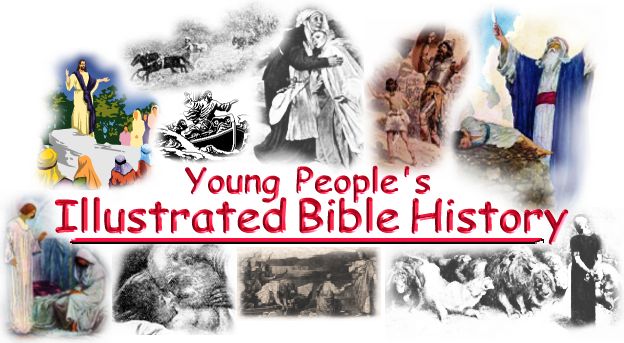
YOUNG PEOPLE'S
ILLUSTRATED BIBLE HISTORY
BEING A SIMPLE AND ATTRACTIVE ACCOUNT OF THE GREAT EVENTS MENTIONED IN THE OLD AND
NEW TESTAMENTS. COMPRISING ALSO THE LIVES OF THE PATRIARCHS, OF CHRIST AND HIS APOSTLES,
AND OF THE REMARKABLE WOMEN AND CHILDREN MENTIONED IN THE SACRED VOLUME.
EACH SECTION CLOSING WITH APPROPRIATE MORAL REFLECTIONS.
ALSO AN APPENDIX, CONTAINING INSTRUCTIVE TABLES AND OTHER VALUABLE MATTER.
WITH AN INTRODUCTION
BY THE AMERICAN EDITOR,
REV. ALVAN BOND, D.D.,
[1793-1882]
(Note from WStS: There is no name given as to the identity
of the author.
Rev. Bond is the only name associated with any of the writings in this book.)
ILLUSTRATED WITH NUMEROUS ELEGANT ENGRAVINGS BY THE MOST EMINENT ARTISTS;
ACCOMPANIED WITH FOUR ACCURATE MAPS OF THE COUNTRIES OF THE BIBLE.
NORWICH, CONN.
THE HENRY BILL PUBLISHING COMPANY,
C. S. HUTCHINS, AUBURN, N.Y.
G. L. BENJAMIN, FOND-DU-LAC, WIS.
1875.
This book is in the public domain.
OCR (Optical Character Recognition) and reformatting by Katie Stewart
(Note from WStS: Additional illustrations have been added from
1. "Story of the Bible" by Rev. Jesse Lyman Hurlbut, D.D. [1904], public
domain,
2. woodcut illustrations by Julius Schnoor von Carolsfeld, from "Das Buch der
Bücher in Bilden,"
used with permission from the World Mission Collection,
3. Christ-Centered Art, used with permission, and
4. Miscellaneous graphics from the public domain.
5. Digital painting of Jehovah Jesus, titled "I Come," by Katie Stewart)
To avoid broken links, due to file length, please wait for the page to
load completely
before selecting
only links 245-253 below.
Thanks.
|
CONTENTS. |
||||
|
|
continued... THE END |
||
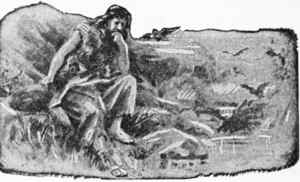
 E read nothing more of
the life of Jesus until He was thirty years old. All this time, perhaps, He was living
at Nazareth with his parents, very quietly and humbly. Joseph was a carpenter; and
Jesus himself might have worked for His daily bread. For "though he was rich,
yet for our sakes he became poor;" and, though He was "equal with God,"
yet "He made Himself of no reputation, and took upon Him the form of a servant,
and was made in the likeness of man." This should teach us humility. "Let
this mind be in you, which was also in Christ Jesus." Phil. ii. 5, 7.
E read nothing more of
the life of Jesus until He was thirty years old. All this time, perhaps, He was living
at Nazareth with his parents, very quietly and humbly. Joseph was a carpenter; and
Jesus himself might have worked for His daily bread. For "though he was rich,
yet for our sakes he became poor;" and, though He was "equal with God,"
yet "He made Himself of no reputation, and took upon Him the form of a servant,
and was made in the likeness of man." This should teach us humility. "Let
this mind be in you, which was also in Christ Jesus." Phil. ii. 5, 7.
Where was John, the son of Zacharias and Elizabeth, all this time? He was in the
deserts of Judea; he was alone, spending all his time in prayer and praise. He forsook
the world, that he might give himself up to the service of God. John had a great
work to do; he was to make ready the way for Christ; and therefore he needed much
time to prepare for this work, by praying to God, and thinking upon holy things.
But a little time before Jesus began His ministry, John came "preaching in the
wilderness of Judea." His raiment was of camel's hair; and he wore a leathern
girdle, and his food was locusts and wild honey. How did he begin his preaching?
He said, "Repent ye, for the kingdom of Heaven is at hand." John told the
people, that Jesus himself was coming to show them the way to Heaven, and to set
up his kingdom in the hearts of those who believed. But if people do not feel their
sinfulness, they will not care for a Saviour; so when John was preparing the way
for Christ, he said first, "Repent ye."

(Click for enlargement.)
JOHN THE BAPTIST PREACHES
Were the people willing to attend to the preaching of John? Yes;
they came to him in great numbers, from Jerusalem, and Judea, and round about Jordan.
Some of them were really penitent; they felt that they were poor sinners unable to
save themselves; and rejoiced to hear that a Saviour was coming, willing and able
to save them. These people confessed their sins; and then John led them into the
river Jordan, and baptized them, as a sign that they were truly penitent, and desired
to give themselves up to the service of God. But the water of baptism had no power
to cleanse their hearts; only the Holy Spirit could do that: and therefore John told
those who came to him, that he could only baptize them with water; but that one was
coming, much, much greater than himself, who would baptize them with the Holy Ghost.
John spoke of the Lord Jesus Christ, who promises to give the Spirit to those who
ask, to renew and sanctify their hearts.
Some of the people who came to be baptized were not truly penitent. The Pharisees
and Sadducees were among them. When John saw them, he warned them very solemnly of
their sins: their pride, and deceitfulness, and unbelief. They were very proud of
being Abraham's children; but John told them that this would not make them acceptable
to God, if they had not Abraham's faith, and love, and obedience. He said, "Every
tree which does not bring forth good fruit is cut down, and thrown into the fire.
Now God is looking for fruit in you; He wishes to see you living in obedience to
His holy commands. You cannot be truly penitent if you do not love Him, and try to
please Him in all you do; and, without true repentance, you must at last perish for
ever." Then some of the people said, "What must we do?" John told
them to be kind one to another, honest in all they did, and contented with what they
had, and then they would show, by their works, that their hearts were sincere, and
that they were truly penitent.
We who have been baptized, profess to be the servants of God. If we really are so,
we shall show our love to Him by obedience; by bringing forth good fruits. You know
what these good fruits are; they are those holy tempers, of which the Bible tells
us, "Love, peace, gentleness, goodness, faith, meekness." Gal. V.
22.
But these holy tempers do not spring up of themselves in our hearts. They are called
"the fruits of the Spirit," because He only can implant them in us, and
make them grow. The only fruits which come up of themselves in our hearts, are bad
fruits; evil passions, and sinful tempers, and wicked thoughts. These are like the
troublesome weeds which grow in our gardens; we must ask God to root them up, and
take them all away, and we should pray Him to make us truly sorry for our sins, and
to pardon them for the sake of Jesus Christ; and beg Him to give us the Holy Spirit
to dwell in our hearts, and enable us to "bring forth fruits meet for repentance."
![]()
Back to the Top
246. JESUS BAPTIZED.
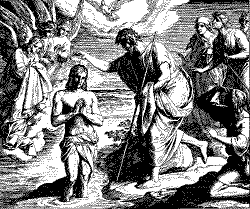
(Click for enlargement.)
JESUS BAPTIZED
 HEN all the people were baptized, John
saw a person coming to him different from any who had come before. All the others
were sinners who needed pardon; but He who was now coming, needed no pardon, for
"He knew no sin." It was the Lord Jesus Christ himself, who had left Nazareth,
and come to Jordan, to be baptized there by John.
HEN all the people were baptized, John
saw a person coming to him different from any who had come before. All the others
were sinners who needed pardon; but He who was now coming, needed no pardon, for
"He knew no sin." It was the Lord Jesus Christ himself, who had left Nazareth,
and come to Jordan, to be baptized there by John.
John was at first very unwilling to baptize Jesus. He felt his own unworthiness,
and said, "I have need to be baptized of thee; and comest thou to me?"
But Jesus answered, "Let it be so now, for thus we must fulfil all righteousness.
Then he suffered Him." Jesus was baptized to show us that baptism is right;
one of God's commands which He came to obey. He submitted to the law in all things,
because, as man, He was to obey that law.
After Jesus had been baptized, as He came out of the water, the Heavens were opened,
and a voice was heard speaking-- the voice of God; and the Holy Spirit came down
from Heaven, in the likeness of a dove, and rested on the head of Jesus. Who were
witnesses of these wonderful transactions? God the Father was in Heaven, looking
down in love upon Jesus, and saying, "This is my beloved Son, in whom I am well
pleased." God the Son, the Lord Jesus Christ, was standing by the river Jordan;
and God the Holy Ghost, the Spirit of peace and love, was resting upon His head in
the likeness of a gentle dove.
We cannot explain how this was; but we must believe it, because God has written it
for us in His word; and all that He says is true, and needful for us to know. We
here may learn who were concerned in the work of our salvation. It was God the Father
who "sent the Son to be the Saviour of the world," and who pardons and
accepts all penitent sinners who come to Him through Jesus Christ. It was God the
Son who came down from Heaven, and bore for us the punishment which we deserve to
bear; and it is He who now "ever liveth to make intercession" for His people,
before His Father's throne. And it is God the Holy Ghost who comes into the hearts
of sinners, who renews, and sanctifies, and prepares them for Heaven.
What did the voice say which spoke from Heaven? It said, "This is my beloved
Son, in whom I am well pleased." God said this, that John and all who heard
it, might know that Jesus was the Son of God; and that the Father accepted Him as
the Saviour of sinners. Do you know and love this wonderful and gracious God of whom
we have been reading? Pray that you may know and love Him more and more; that at
last you may be taken to Heaven, where you will "see Him as He is," and
dwell with. Him for ever.
![]()
Back to the Top
247. THE TEMPTATION.
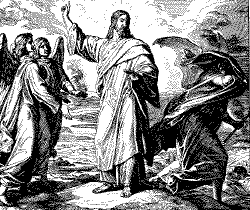
(Click for enlargement.)
SATAN TEMPTS JESUS
 FTER His baptism, Jesus was led by the
Spirit into the wilderness. He was there forty days and forty nights, alone with
the wild beasts. He spent the time in prayer and fasting, and communion with his
heavenly Father.
FTER His baptism, Jesus was led by the
Spirit into the wilderness. He was there forty days and forty nights, alone with
the wild beasts. He spent the time in prayer and fasting, and communion with his
heavenly Father.
When the forty days were ended, Jesus began to be weak and hungry; and at this time
Satan came to Him, to tempt Him. But why did Jesus let Satan come to tempt Him? Because
Jesus was to suffer all that we suffer; and to be tempted like as we are, "yet
without sin." Heb. iv. 15. You remember, when Adam and
Eve had sinned, and God had passed sentence upon them for their sin, He said to Satan,
the serpent, "I will put enmity between thee and the woman, and between thy
seed and her seed; it shall bruise thy head, and thou shalt bruise his heel."
Gen. iii. 15. This seed of the woman was the Lord Jesus Christ.
He came to conquer Satan, and to deliver sinners from his power. Satan was to "bruise
the heel" of Christ-- to trouble and distress him a little; but Christ was to
"bruise the head" of Satan-- to subdue him altogether, and take away his
power. This prophecy was now beginning to be fulfilled.
How did Satan tempt the Saviour? First, he brought stones to Jesus, and said to him,
"Command that these stones be made bread;" for Satan knew that Jesus was
weak, and hungry, and that He could make bread by a miracle if He pleased. But Jesus
knew that it was not the right time for working such a miracle now; so He said to
the tempter, "It is written, man shall not live by bread alone, but by every
word that proceedeth out of the mouth of God." God can preserve life by any
means He pleases, and in all our wants we must trust to Him to provide for us in
the way He appoints and sees best.
Then Satan tried a new temptation. He took Jesus up into a very high mountain, and
there showed Him in a wonderful way which we cannot understand, all the kingdoms
of the earth, and the glory of them; all the riches, and pleasures, and vanities
of the world. Then Satan said, "All these things will I give Thee, if Thou wilt
fall down and worship me." But did these things belong to Satan? Was it in his
power to give them away? No; "the earth is the Lord's, and all that is therein."
The kingdoms of the world, and all their riches, and all their glory, belong to God,
and He can give them, and take them away, as He pleases. But Satan often uses these
things as if they were his and tempts people with them as he tempted Jesus? But what
did Jesus say? He told Satan that it was written in God's word, "Thou shalt
worship the Lord thy God, and Him only shalt thou serve."
Then Satan led Jesus to the top of the temple, and placed Him on the highest part
of the building, and said, "If Thou be the Son of God, cast thyself down; for
it is written, 'He shall command his angels to keep Thee, and in their hands they
shall bear Thee up, that Thou hurt not thy foot against a stone.'" God has promised
to keep those who trust in Him, when they act in faith to His commands; but He does
not promise to keep those who boldly put themselves into danger without His command.
Jesus would not cast Himself down from the temple, because it was not God's will;
so He said to Satan, "It is written, thou shalt not tempt the Lord thy God."
Then Satan left Jesus for a time and holy angels came down from Heaven to comfort
Him in His sorrows. This same Satan who tempted Jesus, tempts us now every day we
live. "The devil, as a roaring lion, walketh about, seeking whom he may devour."
Wherever we go, whatever we do, Satan is near, trying to make us sin. We cannot see
him with our eyes, nor hear his voice speaking to us, as Jesus could; but we can
feel him in our hearts, trying to fill them with evil passions, and sinful tempers,
and wicked thoughts. And how can we conquer this great enemy Satan? Jesus Christ
conquered him by His own power; but we will not. Our hearts are so weak, that, till
they are "renewed by the Holy Spirit," they love to attend to the temptations
of Satan, and choose him, for their master, and not God. How then can we resist him?
Only in the strength of Christ. He will help if we ask Him, and enable us to conquer
Satan through His power. "For in that He himself hath suffered, being tempted,
He is able to succor them that are tempted." Heb. ii. 18.
![]()
Back to the Top
248. THE LAMB OF GOD.
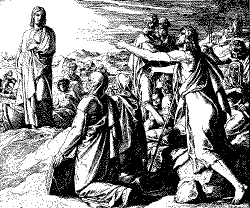
(Click for enlargement.)
BEHOLD, THE LAMB OF GOD
 HEN the Jews heard that a man was preaching
and baptizing near Jordan, they began to wonder who He was. They thought that, perhaps,
He might be the Messiah of whom they had read in the prophets: so they sent priests
and Levites from Jerusalem to ask John, "Who art thou?" John did not wish
to have more honor than belonged to him. He did not want to be thought better or
greater than he really was; so he confessed directly, "I am not the Christ.
I am only come to make ready the way for him. I baptize with water, but there is
one among you who is much greater than I. He can baptize with the Holy Ghost; and
though He comes after me, yet He was before me; and I am not worthy to stoop down
and unloose the latches of His shoes." John spoke of the Lord Jesus Christ,
who came into the world, and began to preach after John the Baptist; but Jesus always
was, for He is the eternal Son of God without beginning, and without end.
HEN the Jews heard that a man was preaching
and baptizing near Jordan, they began to wonder who He was. They thought that, perhaps,
He might be the Messiah of whom they had read in the prophets: so they sent priests
and Levites from Jerusalem to ask John, "Who art thou?" John did not wish
to have more honor than belonged to him. He did not want to be thought better or
greater than he really was; so he confessed directly, "I am not the Christ.
I am only come to make ready the way for him. I baptize with water, but there is
one among you who is much greater than I. He can baptize with the Holy Ghost; and
though He comes after me, yet He was before me; and I am not worthy to stoop down
and unloose the latches of His shoes." John spoke of the Lord Jesus Christ,
who came into the world, and began to preach after John the Baptist; but Jesus always
was, for He is the eternal Son of God without beginning, and without end.
The day after Job had spoken to the priests and Levites, he saw Jesus coming, and
pointed to Him, and said, "That is he of whom I was speaking yesterday, who
is so much greater than I, and who was before me. It is He whom I baptized a time
ago; and I then saw the Heavens open, and the Spirit come down like a dove, and rest
upon Him. I know that He is the Son of God. Behold the Lamb of God which taketh away
the sin of the world."
Why did John call Jesus the Lamb of God? You remember that the Jews, by the command
of God, used to sacrifice a lamb every morning and every evening, and also at the
feast of the Passover, and at many other times. The priests killed the lamb, and
sprinkled the blood upon the people; and if the people came to the sacrifice by faith,
they were pardoned by God, and their sins were taken away. But it was not the lamb's
blood-- it was the blood of Christ that took their sins away. All the sacrifices
were typical of Him; He was called "the Lamb of God" and "the Lamb
slain from the foundation of the world," because God had chosen Him from eternity
to be a sacrifice for sin. Therefore John said of Jesus, "Behold the Lamb of
God which taketh away the sin of the world."
And the lamb is a type of Jesus too, because it is so harmless, and meek, and gentle.
So Christ was "without blemish and without spot;" perfectly holy; there
was no sin in Him; and He was meek and gentle too; He was patient under all sufferings.
"He was brought as a lamb to the slaughter, a sheep before her shearers is dumb,
so He opened not his mouth."
This holy Lamb of God is not now upon our earth, as He was when John saw Him. He
is on His glorious throne in Heaven, and many of His happy people are with Him there.
But He is a Saviour still; and ready to take away the sins of all those who come
to Him in faith and prayer. But He will not always be a Saviour. When the dreadful
day of judgment comes, He will not hear the prayers of those who despise and forget
Him now. He will then look upon them in anger, not in pity and love; and they will
say to the mountains and rocks, "Fall on us, and hide us from the face of Him
that sitteth on the throne, and from the wrath of the Lamb. For the great day of
His wrath is come, and who shall be able to stand?"
If we wish to be safe and happy in that dreadful day, we must ask now to be "washed
in the blood of the Lamb," and to have our names written "in the Lamb's
book of life." And then, when we die, we shall be taken to join the happy company
in Heaven, and sing with them, "Blessing, and honour, and glory, and power,
be unto Him that sitteth upon the throne, and unto the Lamb for ever and ever."
![]()
Back to the Top
249. DISCIPLES BROUGHT TO JESUS.
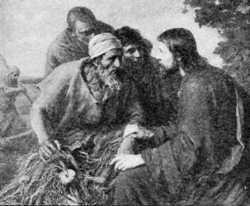
(Click for enlargement.)
SIMON PETER AND ANDREW FOLLOW
 HE next day, as John was standing with
two of his disciples, he saw Jesus again, and said to them, "Behold the Lamb
of God." The two disciples were very glad to hear that Jesus was so near, and
they left John, and followed Him.
HE next day, as John was standing with
two of his disciples, he saw Jesus again, and said to them, "Behold the Lamb
of God." The two disciples were very glad to hear that Jesus was so near, and
they left John, and followed Him.
Was John sorry to lose them? No; he was glad that they were so anxious to be with
Jesus; for he knew that Jesus could do much more for them than he could. John could
only preach and talk to them; but Jesus could save their souls. He was John's Saviour,
and He would be the disciples' Saviour too.
When Jesus turned round, and saw the two disciples following, He said to them, "What
seek ye?" They answered, "Master, where dwellest Thou?" Then Jesus
told them to come and see; so they came and saw where He dwelt, and stayed with Him
that day; for it was now evening. What a happy evening it must have been for the
disciples! They had many questions to ask; and Jesus was willing to answer them;
but the disciples did not wish to keep their happiness to themselves. They wanted
their friends to know and love Jesus too. One of these disciples was named Andrew.
He had a brother called Simon; and as soon as Andrew had seen Jesus, he ran to Simon,
and said, "We have found the Messiah, the Christ!" and he brought his brother
to Jesus. Jesus received Simon very kindly; and Simon loved his Saviour with all
his heart. We shall often read about him again, for he was one of the twelve apostles.
He was called Peter as well as Simon.
The next day, Jesus found a man named Philip, who lived in Bethsaida, the city in
which Andrew and Simon Peter lived. Jesus said to Philip, "Follow me."
Philip was willing to obey the command, but, like Andrew, Philip did not wish to
go alone to Jesus, he wanted to bring others with him. He had a friend named Nathanael,
who was a very good man. Nathanael loved to read the holy word of God, and there
he had learnt much about the Messiah; and he was waiting and wishing for the coming
of Jesus; but he had not yet seen Him. Philip knew how anxious Nathanael was to know
Jesus, so he went directly, to tell him that Jesus was come.
Philip soon found his friend. He was sitting under a fig-tree, thinking of holy things,
and praying to be taught more of that blessed Saviour whom he loved so much. When
Philip saw Nathanael, he said, "We have found Him of whom Moses and the prophets
wrote,-- Jesus of Nazareth, the son of Joseph." Nathanael felt, at first, unwilling
to believe that Jesus could be the Messiah. The Jews disliked the city of Nazareth
very much, and thought that nothing good could come out of it. And Nathanael had
read, too, in the prophets, that the Messiah was to be born in Bethlehem, not in
Nazareth. This was true; and Jesus had been born in Bethlehem; but Nathanael did
not know it; so he said to Philip, "Can any good thing come out of Nazareth?"
Philip answered, "Come and see;" and he brought Nathanael to Jesus.
When Jesus saw Philip and his friend coming, He pointed to Nathanael, and said to
those who stood by, "Behold an Israelite indeed, in whom is no guile."
Jesus meant, that Nathanael was sincere; that he really loved God; really wanted
to know and believe in Christ. He was "an Israelite indeed;" one of the
true people of God; not like the Pharisees who boasted that they were Israelites,
but did not truly love the God of Israel. The Pharisees were hypocrites, only pretending
to be God's people; but Nathanael was sincerely seeking to serve God in the right
way.
Nathanael wondered very much to hear Jesus speak in this way; and he said, "Whence
knowest thou me?" Jesus answered, "Before Philip called thee, when thou
wast under the fig-tree, I saw thee." Jesus knew all the thoughts of Nathanael--
all his wants, and all his desires; He had heard his prayers from the first moment
Nathanael began to pray; Jesus knew all this, because He was God.
When Nathanael heard what Jesus said, he felt that this wonderful person must be
the Christ, the true Messiah; and he said to Jesus, "Master, Thou art the Son
of God; Thou art the King of Israel." Jesus answered, "Because I said,
I saw thee under the fig-tree, believest thou? Thou shalt see greater things than
these. Hereafter ye shall see Heaven open, and the angels of God ascending and descending
upon the Son of man." Jesus spoke of that wonderful day when He will come again
in His glory, and every eye will see Him; but only those who love Him as their Saviour
now, will rejoice to look upon Him then.
If we know Jesus ourselves, we should try, like Andrew and Philip, to lead others
to Him also. Perhaps we may have brothers, or sisters, or friends, who do not yet
love Jesus. Then we ought to ask them to come and seek Him. How pleasant it will
be, as we journey to Heaven, to see our dear friends going there with us. We should
say to all we love, to remember what Moses said to his father-in-law Hobah, in the
wilderness: "We are journeying to the place of which the Lord said, I will give
it you; come with us, and we will do thee good."
![]()
Back to the Top
250. WATER MADE WINE.
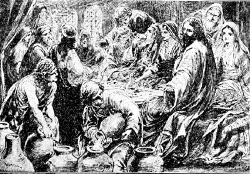
(Click for enlargement.)
WEDDING IN CANA
 LITTLE time after this, Jesus went to
Galilee. There was a marriage in Cana; and Jesus, and His mother, and His disciples,
were invited to the marriage feast. A great many people were at this feast; the wine
was soon drunk, and they wanted more; so the mother of Jesus turned to Him, and said,
"They have no wine." Then Jesus told Mary not to trouble herself about
this, but to wait patiently, and leave all to Him. For though Jesus submitted to
His mother, because, as man, He was her son; yet, sometimes, He reproved and instructed
her too, because, as God, He was her Lord and Master. Mary knew this; and she always
humbly attended to what Jesus said.
LITTLE time after this, Jesus went to
Galilee. There was a marriage in Cana; and Jesus, and His mother, and His disciples,
were invited to the marriage feast. A great many people were at this feast; the wine
was soon drunk, and they wanted more; so the mother of Jesus turned to Him, and said,
"They have no wine." Then Jesus told Mary not to trouble herself about
this, but to wait patiently, and leave all to Him. For though Jesus submitted to
His mother, because, as man, He was her son; yet, sometimes, He reproved and instructed
her too, because, as God, He was her Lord and Master. Mary knew this; and she always
humbly attended to what Jesus said.
The servants were in the room, waiting upon the company, and Mary spoke to them,
and said, "Whatsoever He saith unto you, do it." There were set there six
pots of stone, to hold water for cleansing and washing; for the Jews were very particular
about these things.

(Click for enlargement.)
TURN WATER INTO WINE
Jesus said to the servants, "Fill the water-pots with water;"
so they filled them up to the brim. Then Jesus told the servants to pour out, and
carry it to the governor of the feast. The servants did as Jesus commanded. They
poured out what was in the water-pots, and took it to the governor, and he drank
it. But it was not water now. The wonderful power of Jesus had, in one moment, turned
the water into wine. The governor did not know what had been done; but he was very
much pleased with the wine, because it was so good; and he called the bridegroom,
and said, "Thou hast kept the best wine until now." The mother of Jesus,
and His disciples, and the servants, all knew who it was that had made this good
wine; and wondered at the great power of Jesus, and "His disciples believed
on Him."
This was the first miracle which Jesus did. We have often read of miracles in the
Old Testament History. Moses turned water into blood, at the the command of God;
afterwards he sweetened the bitter waters of Marah; and then again, he struck the
rock at Meribah, and water rushed out. Elijah and Elisha too, and many others, worked
miracles. But the way in which they worked them, was not like the way in which Christ
worked them. The prophets wrought wonders by the command of God; Christ wrought them
by His own power. He had power to do any wonder He pleased, because He was God.
![]()
Back to the Top
251. THE TEMPLE CLEANSED.

(Click for enlargement.)
JESUS DRIVES OUT MONEYCHANGERS
 OON after the feast in Cana of Galilee,
Jesus went to Jerusalem, to the passover which was kept there at this time, and He
entered into the temple. We have often read of the temple at Jerusalem. You remember
the glorious one which Solomon built, and which Nebuchadnezzar's army threw down
and destroyed. After the Babylonish captivity, the Jews built a new temple, but not
as large and beautiful as the first. This second temple was rebuilt and beautified
by king Herod, and the Jews were proud of it, and admired it very much. But they
did not honor it in the way God's house ought to be honored. When Jesus came into
the temple, He found people there selling oxen, and sheep, and doves. These animals
were used for the sacrifices; but they should not have been sold within the holy
walls of God's house. Jesus was very angry with the people who were buying and selling
in the temple. He drove them all out, and the sheep, and the oxen; and threw down
the tables, and poured out the money, and said to those that sold doves, "Take
these things away; make not my Father's house a house of merchandise." The temple
belonged to God; and therefore Jesus would not let it be dishonored.
OON after the feast in Cana of Galilee,
Jesus went to Jerusalem, to the passover which was kept there at this time, and He
entered into the temple. We have often read of the temple at Jerusalem. You remember
the glorious one which Solomon built, and which Nebuchadnezzar's army threw down
and destroyed. After the Babylonish captivity, the Jews built a new temple, but not
as large and beautiful as the first. This second temple was rebuilt and beautified
by king Herod, and the Jews were proud of it, and admired it very much. But they
did not honor it in the way God's house ought to be honored. When Jesus came into
the temple, He found people there selling oxen, and sheep, and doves. These animals
were used for the sacrifices; but they should not have been sold within the holy
walls of God's house. Jesus was very angry with the people who were buying and selling
in the temple. He drove them all out, and the sheep, and the oxen; and threw down
the tables, and poured out the money, and said to those that sold doves, "Take
these things away; make not my Father's house a house of merchandise." The temple
belonged to God; and therefore Jesus would not let it be dishonored.
We, like the Jews, have temples for the worship of God;-- how do we use them? We
never see people buying and selling in our churches; but there is a way of dishonoring
God's house without doing this. How? By bringing worldly thoughts into His holy temple.
Some people, perhaps, think about their money; some about their shops; some about
their every-day work and business; some about their pleasures, or their dress, while
they are in God's house. They think of these worldly things, instead of thinking
of God, and Christ, and Heaven; instead of confessing their sins with all their hearts,
and asking for pardon and grace. This makes God very angry. He gives no blessing
to these careless, worldly minded people. They go away from the house of God with
His frown upon them, and not His smile. If we wish for a blessing when we go into
the temple of God, we must pray that all our vain, foolish, worldly thoughts may
be taken away before we go there; and ask God Himself to take possession of our hearts.
![]()
Back to the Top
252. NICODEMUS.
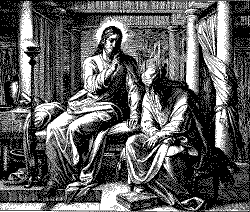
(Click for enlargement.)
JESUS AND NICODEMUS
 HERE was a man of the
Pharisees named Nicodemus, a ruler of the Jews. The Pharisees were not, in general,
followers of Jesus. They were proud and self-righteous, and thought themselves too
good to need a Saviour; so they hated and despised Him. But Nicodemus was not like
these proud men. He was humble and willing to come to Jesus.
HERE was a man of the
Pharisees named Nicodemus, a ruler of the Jews. The Pharisees were not, in general,
followers of Jesus. They were proud and self-righteous, and thought themselves too
good to need a Saviour; so they hated and despised Him. But Nicodemus was not like
these proud men. He was humble and willing to come to Jesus.
Nicodemus had heard a great deal of the miracles and wonders which Jesus did, and
thought He must be a very holy man; a prophet, perhaps, sent by God; but Nicodemus
did not, at first, feel quite sure that Jesus was the Son of God. So, like Andrew,
and Simon, and Philip, he determined to "come and see." But Nicodemus did
not, like those good men, follow Jesus boldly. He was afraid or ashamed to do this.
Perhaps he thought his friends might persecute or despise him if they saw him going
to Jesus of Nazareth. So Nicodemus went to Christ secretly, by night, when none could
see him. The faith of Nicodemus was very weak and small; yet Jesus did not send him
away; He casts out none who come to Him.
What did Nicodemus say when he came to Jesus? He said, "Master, we know that
thou art a teacher come from God; for no man can do those miracles that Thou doest
except God be with him." Jesus answered, "Verily, verily, I say unto thee,
except a man be born again, he cannot see the kingdom of God." And afterwards
He said, "Except a man be born of water and of the Spirit, he cannot see the
kingdom of God." Nicodemus did not understand what Jesus meant. He did not know
what it is to be "born again." Do you know? It is very needful for us all
to understand what it is to be "born again."
When the Holy Spirit comes into the heart, then the heart is made new and clean,
just as anything is made clean that is washed with water. Before, it loved sin and
Satan; but now, it will love God and holiness. St. Paul spoke of this change of heart,
when he said, "Old things have passed away; behold, all things are become new."
This is being "born again."
We cannot understand how all this can be. We cannot see the Holy Spirit of God working
in the heart, and making it new and clean; but we can see the good fruits,-- the
holy tempers which He causes to spring up. When Jesus was explaining these things
to Nicodemus, He said, "The wind bloweth where it listeth; and thou hearest
the sound, but canst not tell whence it cometh, nor whither it goeth; so is every
one that is born of the Spirit." We can hear the wind blow; we can see the trees
shaken by it: but we cannot see the wind itself; it is invisible. So, when the Holy
Spirit comes into the heart, we see that a person is changed,-- different from what
he was before; and we know that God's Holy Spirit must have made the change; but
this is all we know. We cannot see the Spirit; He is invisible like the wind.
Do you understand now what it is to be born again? It is to have a new heart; to
be made a child of God. Has your heart been changed? You "cannot enter into
the kingdom of God," till it is. Ask God then to take away your "stony
heart," and to give you "a heart of flesh." Say, "Create in me
a clean heart, O God, and renew a right spirit within me." Psalm li.
10.
Nicodemus wondered very much at what Jesus said, and asked "How can these things
be?" Nicodemus was a learned man; "a ruler of the Jews," "a master
in Israel," and yet he could not understand the things of God, till Jesus explained
them to him. And so it is with us all. People can never rightly understand heavenly
things without God's teaching. The natural man receiveth not the things of the Spirit
of God; neither can he know them, because they are spiritually discerned."
Nicodemus felt his ignorance and was anxious to be taught; and Jesus was ready and
willing to teach him. He told him not only of the Spirit's power in renewing the
heart, but of the Father's love in finding out a way of salvation for sinners, and
of Himself as that way. He said, "God so loved the world, that He sent His only-begotten
Son, that whosoever believeth in Him should not perish, but have everlasting life."
he told Nicodemus about the serpent of brass raised by Moses in the wilderness, upon
which the bitten Israelites looked and were healed. The brazen serpent was a type
of the Lord Jesus. Nicodemus had often read the story; but, perhaps, he had never
understood it rightly, till Jesus said to him, "As Moses lifted up the serpent
in the wilderness, so must the Son of Man be lifted up, that whosoever believeth
in Him should not perish, but have eternal life." Jesus must be lifted up upon
the cross and die, that perishing sinners, who look to Him in faith, may be eternally
saved.
What wonderful things Nicodemus heard from Jesus that night! He was very glad to
hear them; and he went away believing that Jesus was not only a prophet, but that
He was "the only-begotten Son of God," the Messiah, the Saviour of sinners.
When we read of Nicodemus again, we shall find that his faith became stronger, and
that he learnt not to be ashamed nor afraid of confessing himself a disciple of Jesus.
![]()
Back to the Top
253. JOHN THE BAPTIST IMPRISONED.
 BOUT this time, John the
Baptist was thrown into prison by Herod the tetrarch of Galilee. This Herod was a
son of the cruel king of Judea who had murdered the little children of Bethlehem.
He was cruel and wicked like his father. When John first began to preach, Herod the
tetrarch liked him, and did many things which John said was right, "and heard
him gladly." But when John faithfully and boldly reproved him for his sins,
Herod grew angry; for he loved sin, and did not like to give it up. So he took John
and cast him into prison, that he might hear his warnings and reproofs no more.
BOUT this time, John the
Baptist was thrown into prison by Herod the tetrarch of Galilee. This Herod was a
son of the cruel king of Judea who had murdered the little children of Bethlehem.
He was cruel and wicked like his father. When John first began to preach, Herod the
tetrarch liked him, and did many things which John said was right, "and heard
him gladly." But when John faithfully and boldly reproved him for his sins,
Herod grew angry; for he loved sin, and did not like to give it up. So he took John
and cast him into prison, that he might hear his warnings and reproofs no more.
Do you think it was very wicked of Herod to do this? It was. Many people are impatient
and angry when a faithful minister or a kind friend warns them of their sins, and
of the dreadful end of sin if unrepented of. Even children are often very angry,
when reproved of their faults by their kind parents or teachers. Instead of attending
humbly to what is said, they are sullen and angry because they are told of their
faults, not sorry because they have done wrong. All this is very wicked, and very
foolish too; for those who kindly reprove us, are our best friends; and Solomon says,
"He that heareth reproof getteth understanding."
.
END OF THIS PAGE
More of the NEW TESTAMENT to come in this series.
THE OLD TESTAMENT has
been started.
Installments of the two testaments will be added alternately.
![]()
Related Topic:
From Your Mother
---New
Window
by E. J. C--- (May 1880)
-- A Poem --
A volume of the book, entitled,
"Young People's Illustrated Bible History,"
once bought at an auction,
had a beautiful poem, written in script, inside of the front cover,
which was signed:
"--from your mother."
Discover the sensitive testimony connected with the poem, the book, a mother, and
her son.
![]()
Section Index for Stories
Readers are permitted and encouraged to copy and freely share this article with others.
.
Homepage Holy Bible
.Jehovah Jesus
Timeline
.Prophecy
Philadelphia
Fellowship
Promises
Stories
Poetry
Links
Purpose ||.What's New
|| Tribulation Topics || Download Page || Today's Entry
Topical Links:
Salvation || Catholicism || Sound Doctrine || Prayer
Privacy Policy
.